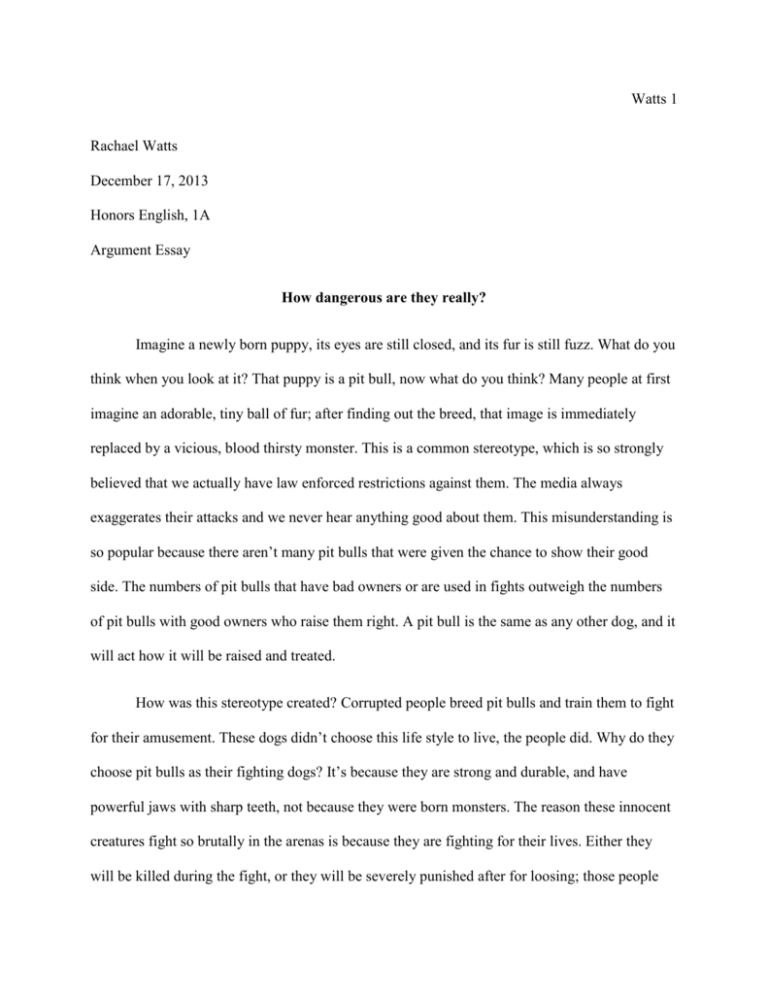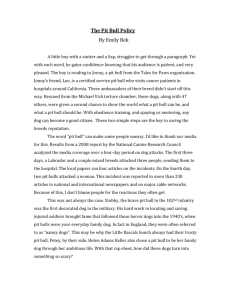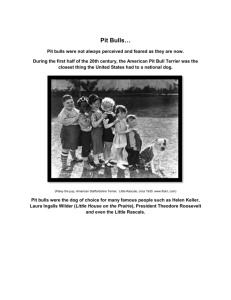How dangerous are they really?
advertisement

Watts 1 Rachael Watts December 17, 2013 Honors English, 1A Argument Essay How dangerous are they really? Imagine a newly born puppy, its eyes are still closed, and its fur is still fuzz. What do you think when you look at it? That puppy is a pit bull, now what do you think? Many people at first imagine an adorable, tiny ball of fur; after finding out the breed, that image is immediately replaced by a vicious, blood thirsty monster. This is a common stereotype, which is so strongly believed that we actually have law enforced restrictions against them. The media always exaggerates their attacks and we never hear anything good about them. This misunderstanding is so popular because there aren’t many pit bulls that were given the chance to show their good side. The numbers of pit bulls that have bad owners or are used in fights outweigh the numbers of pit bulls with good owners who raise them right. A pit bull is the same as any other dog, and it will act how it will be raised and treated. How was this stereotype created? Corrupted people breed pit bulls and train them to fight for their amusement. These dogs didn’t choose this life style to live, the people did. Why do they choose pit bulls as their fighting dogs? It’s because they are strong and durable, and have powerful jaws with sharp teeth, not because they were born monsters. The reason these innocent creatures fight so brutally in the arenas is because they are fighting for their lives. Either they will be killed during the fight, or they will be severely punished after for loosing; those people Watts 2 are the monsters. The article “Forced to Fight and Left to Die” explains, “Dogs who are used for fighting are chained, taunted, and starved in order to trigger extreme survival instincts and encourage aggressiveness.” Basically, the article is saying that they torture them and force them to fight, solely for the purpose of their entertainment. If those types of people didn’t exist, neither would the stereotype. If the dogs were raised right and had only good owners, there would be no problem with them at all. According to Andrea Arden, “If all pit bulls were treated in this fashion, it might help some of those generalizations fade, simply by adding more well behaved pit bulls in the world.” There are many more vicious pit bulls than well-mannered ones, which is why this stereotype is so strong. People just need to know that not all of them are the same, then more people would accept them which would give pit bulls the loving homes they want and deserve. Furthermore, like any other dog, pit bulls are only reflections of their owners; they are what you choose to make them. This stereotype has grown to the point where states have varying laws against pit bulls. Specifically, over 600 U.S. cities have enacted breed-specific laws (BSL) that reject pit bulls. Many apartment complexes, parks and even dog parks ban them. In some regions in Utah, it is unlawful to own or sell them. In many states it’s illegal to breed them, and even require an annual permit just to own one. They are always the last to be chosen and the first to be put down, that is, if the shelters even accept them. They are rejected, homeless, and many people who do have them aren’t the best owners or trainers. That is the reason why they still attack sometimes. If more people could give them a chance and treat them how they would with any other dog, there would be significantly fewer attacks. Watts 3 Generally, when there is a pit bull attack it is blasted throughout the news. People exaggerate these attacks and make a bigger deal about it than with any other dog. What the news fails to report about are the heroic stories. Pit bulls are actually very smart, loving, and loyal dogs, in my opinion. On KSL.com, there’s a story of a pit bull, TatorTot, who saved a boy’s life. Tracie Snowder reports, “Smith's son, Peyton Anderson, was in bed when the 10-month-old pit bull started whining and barking in the middle of the night. TatorTot apparently sensed something was wrong with the boy. Smith quickly went to check on her son.” The boy’s blood sugar was dangerously low and he could barely breathe. Because of TatorTot, they were able take him to the hospital and save his life. Another pit bull saved a cat from hungry coyotes. Bryan Nelson states, “Dogs and cats are supposed to be mortal enemies, but Jack the pit bull would risk everything to save his feline friend.” In other words, Bryan believes this pit bull is extraordinary among other dogs; while most other dogs wouldn’t have done this, people still say pit bulls are low. USA Today tells of a story where a pit bull saves his family from a house fire. Sean Rossman summarizes, “At about 2 a.m. Thursday, Onyx began barking so loudly that he awakened his family, and Trevor Myres, Sierra Plair and their two sons were able to get out of their house here safely. But when Myres found Onyx yelping on the patio outside, he noticed that the dog was on fire.” Onyx burned as much as 30% of his body to save the family. Finally, BSL News has a Pit Bull Heroes Hall of Fame page which contains many unbelievably brave stories. Many are about fires, home invasions and attackers, but the titles that stand out most are: “Pit Bull Defends Home against Bear”, “Pit Bull Pulls Unconscious Owner from Trains Path” and “Pit Bull Takes Bullet to Save Owner”. These families and owners ignored the common stereotype and gave a pit bull a chance. Because they saved the dogs’ lives, the pit bulls returned Watts 4 the favor. Just like any other dog, their actions reflected how they were raised and treated. These daring dogs risked, and in some cases, gave their lives for the ones they love. In final conclusion, pit bulls are merely reflections of us. Unfortunately, most reflect bad people, so society creates a stereotype and sees every pit bull the same. This stereotype has spread so much that most of our states ban them. No one ever hears about their valiant actions. It’s important to not judge others by stereotypes. People need to realize that not every pit bull is the same; they need to give them a chance to have a good home with a loving family. Then more pit bulls would be well-mannered and this stereotype would disappear. We need to understand that pit bulls are the same as any other dog. Watts 5 Work Cited Page Peta2. “Dogfighting.” peta2.com.McGrath Family Foundation, 2013. Web. 15 Dec. 2013. Arden, Andrea. “Stereotypes and generalizations of the pit bull.” Pets for Patriots. Petiquette with Andrea Arden, 2013. Web. 15 Dec. 2013. “Breed-specific laws state-by-state.” DogsBite.org. Lynn Media Group, 16 Dec. 2013. Web. 15 Dec. 2013. Snowder, Tracie. “Newly rescued pit bull saves life of owner’s son.” KSL.com. 11 Oct. 2013. Web. 15 Dec. 2013. Nelson, Bryan. “Pit bull saves cat from hungry coyotes.” mnn.com. Mother Nature Network, 12 Oct. 2013. Web. 15 Dec. 2013. Rossman, Sean. “Hero pit bull saves Florida family from house fire.” USA Today. A Gannett Company, 27 Sept. 2013. Web. 15 Dec. 2013. “Pit Bull Heroes Hall of Fame.” bslnews.org. BSL news, n.d. Web. 15 Dec. 2013.




